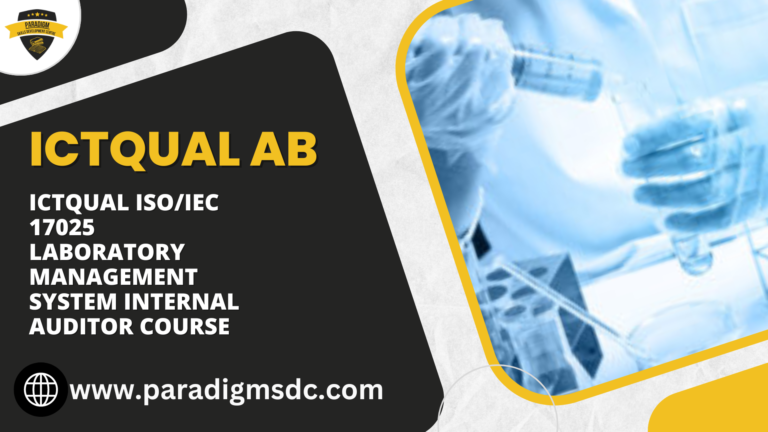Course Introduction
The ICTQual Level 8 Professional Diploma in Energy Management is an advanced qualification aimed at professionals who aspire to become experts in energy management. This diploma equips learners with the knowledge and skills required to develop, implement, and manage energy strategies effectively. The course addresses contemporary challenges in energy management, including sustainability, efficiency, and regulatory compliance.
Course Overview
This rigorous program covers a wide range of topics essential for proficient energy management. It combines theoretical knowledge with practical applications, ensuring that learners are well-prepared to handle real-world energy issues. The course is delivered through a blend of lectures, workshops, case studies, and project work, providing a holistic learning experience.
Course Study Units
Study Unit 1: Advanced Energy Policy and Regulatory Frameworks
- Overview of Global and National Energy Policies:
- In-depth analysis of major international and national energy policies, including renewable energy mandates and carbon reduction targets.
- Energy Legislation and Compliance:
- Examination of regulatory frameworks and compliance strategies for energy management.
- Comparative Analysis:
- Comparative study of energy policies and regulations across different countries and regions.
- Policy Implementation and Enforcement:
- Case studies on successful energy policy implementation and enforcement mechanisms.
- Impact Assessment:
- Critical evaluation of the impact of energy policies on market dynamics, technology adoption, and sustainability outcomes.
Study Unit 2: Advanced Energy Efficiency and Sustainable Technologies
- Principles of Energy Efficiency:
- Advanced principles and methodologies for improving energy efficiency in various sectors.
- Technological Innovations:
- Exploration of cutting-edge technologies for sustainable energy production, storage, and utilization.
- Sustainable Energy Systems:
- Design and optimization of sustainable energy systems, including smart grids and microgrids.
- Case Studies:
- Examination of successful implementations of energy-efficient technologies and sustainable energy systems.
- Quantitative Analysis:
- Use of quantitative tools and techniques to measure and enhance energy efficiency.
Study Unit 3: Renewable Energy Integration and Management
- Renewable Energy Sources:
- Comprehensive study of various renewable energy sources such as solar, wind, hydro, biomass, and geothermal.
- Integration Strategies:
- Strategies for integrating renewable energy into existing energy systems and infrastructure.
- Grid Management and Stability:
- Advanced concepts in grid management, including balancing supply and demand and ensuring grid stability with high penetration of renewables.
- Economic and Environmental Impact:
- Analysis of the economic and environmental impacts of renewable energy projects.
- Case Studies:
- Detailed case studies on successful renewable energy projects and their management.
Study Unit 4: Strategic Energy Management and Leadership
- Energy Management Systems:
- Design and implementation of advanced energy management systems (EMS) in organizations.
- Leadership in Energy Management:
- Examination of leadership strategies and their application in driving energy management initiatives.
- Strategic Planning and Decision Making:
- Development of strategic plans for energy management, including investment and risk management.
- Corporate Sustainability:
- Integration of energy management into broader corporate sustainability and social responsibility strategies.
- Case Studies:
- Analysis of leadership and strategic management practices in leading energy organizations.
Research Project: Advanced Topics in Energy Management
- Topic Selection:
- Selection of a specific advanced topic within the field of energy management that aligns with personal interests and career goals.
- Comprehensive Literature Review:
- Conduct a comprehensive literature review to explore the latest research, trends, and debates related to the chosen topic.
- Critical Analysis and Synthesis:
- Critically analyze the findings and synthesize them into a coherent report, highlighting key insights, gaps in knowledge, and implications for practice.
- Research Skills Demonstration:
- Demonstrate advanced research skills, critical thinking abilities, and a deep understanding of advanced energy management concepts.
- Presentation of Findings:
- Present the report findings to peers and faculty for feedback and discussion, effectively communicating the research outcomes.
Learning Outcomes
Upon completing the ICTQual Level 8 Professional Diploma in Energy Management, learners will be able to:
Study Unit 1: Advanced Energy Policy and Regulatory Frameworks
- Comprehensive Understanding: Demonstrate a comprehensive understanding of major international and national energy policies, including renewable energy mandates and carbon reduction targets.
- Regulatory Expertise: Analyze regulatory frameworks and compliance strategies for energy management, identifying key requirements and obligations.
- Comparative Analysis: Conduct a comparative study of energy policies and regulations across different countries and regions, identifying similarities, differences, and best practices.
- Case Study Evaluation: Evaluate case studies on successful energy policy implementation and enforcement mechanisms, extracting lessons learned and assessing their applicability to different contexts.
- Impact Assessment: Critically evaluate the impact of energy policies on market dynamics, technology adoption, and sustainability outcomes, identifying strengths, weaknesses, and areas for improvement.
Study Unit 2: Advanced Energy Efficiency and Sustainable Technologies
- Advanced Principles: Apply advanced principles and methodologies for improving energy efficiency in various sectors, considering technological advancements and best practices.
- Technological Exploration: Explore cutting-edge technologies for sustainable energy production, storage, and utilization, assessing their feasibility and potential impact.
- Systems Design: Design and optimize sustainable energy systems, including smart grids and microgrids, considering factors such as reliability, efficiency, and environmental impact.
- Case Study Analysis: Analyze case studies of successful implementations of energy-efficient technologies and sustainable energy systems, identifying key factors contributing to their success.
- Quantitative Skills: Utilize quantitative tools and techniques to measure and enhance energy efficiency, applying methods such as energy audits and performance benchmarking.
Study Unit 3: Renewable Energy Integration and Management
- Renewable Energy Knowledge: Demonstrate a comprehensive understanding of various renewable energy sources and their potential applications, including solar, wind, hydro, biomass, and geothermal.
- Integration Strategies: Develop strategies for integrating renewable energy into existing energy systems and infrastructure, considering technical, economic, and regulatory considerations.
- Grid Management Expertise: Understand advanced concepts in grid management, including balancing supply and demand and ensuring grid stability with high penetration of renewables, ensuring reliable and efficient operation.
- Impact Assessment: Analyze the economic and environmental impacts of renewable energy projects, assessing factors such as cost-effectiveness, environmental sustainability, and social acceptance.
- Case Study Examination: Evaluate detailed case studies on successful renewable energy projects and their management, identifying key success factors and lessons learned for future projects.
Study Unit 4: Strategic Energy Management and Leadership
- Energy Management Systems Design: Design and implement advanced energy management systems (EMS) in organizations, considering factors such as data collection, analysis, and reporting.
- Leadership Strategies: Examine leadership strategies and their application in driving energy management initiatives, fostering organizational commitment and engagement.
- Strategic Planning: Develop strategic plans for energy management, including investment and risk management strategies, aligning organizational goals with energy objectives.
- Corporate Sustainability Integration: Integrate energy management into broader corporate sustainability and social responsibility strategies, ensuring alignment with organizational values and objectives.
- Case Study Analysis: Analyze case studies of leadership and strategic management practices in leading energy organizations, identifying key success factors and transferable lessons.
Research Project: Advanced Topics in Energy Management
- Topic Selection: Select a specific advanced topic within the field of energy management that aligns with personal interests and career goals, demonstrating a clear understanding of relevant issues and challenges.
- Literature Review: Conduct a comprehensive literature review to explore the latest research, trends, and debates related to the chosen topic, demonstrating proficiency in academic research methods and information synthesis.
- Critical Analysis: Critically analyze the findings from the literature review, synthesizing key insights and identifying gaps in knowledge, demonstrating advanced critical thinking and analytical skills.
- Research Skills Demonstration: Demonstrate advanced research skills, including data collection, analysis, and interpretation, showcasing the ability to conduct independent research at an advanced level.
- Presentation of Findings: Present the report findings to peers and faculty for feedback and discussion, effectively communicating the research outcomes and demonstrating proficiency in oral communication and presentation skills.
Course Benefits
- Expertise Development: Gain advanced knowledge and skills in energy management.
- Career Advancement: Enhance career prospects with a prestigious qualification.
- Practical Skills: Learn through real-world applications and case studies.
- Networking Opportunities: Connect with industry experts and peers.
- Sustainability Focus: Contribute to sustainable energy practices and solutions.
Who is This Course For?
The ICTQual Level 8 Professional Diploma in Energy Management is ideal for:
- Energy managers and consultants seeking advanced qualifications.
- Engineers and technical professionals looking to specialize in energy management.
- Sustainability officers and environmental managers.
- Project managers and financial analysts in the energy sector.
- Government and regulatory professionals involved in energy policy.
Future Progression
Graduates of this diploma can pursue various advanced career paths and educational opportunities, including:
- Senior roles in energy management and consultancy.
- Leadership positions in sustainability and environmental management.
- Advanced research and academic pursuits in energy studies.
- Specialized certifications and professional development in related fields.
- Contribution to policy-making and strategic planning in the energy sector.
Embark on a journey towards becoming an expert in energy management with the ICTQual Level 8 Professional Diploma. Equip yourself with the knowledge and skills to lead sustainable energy initiatives and make a significant impact in the industry.
4o







